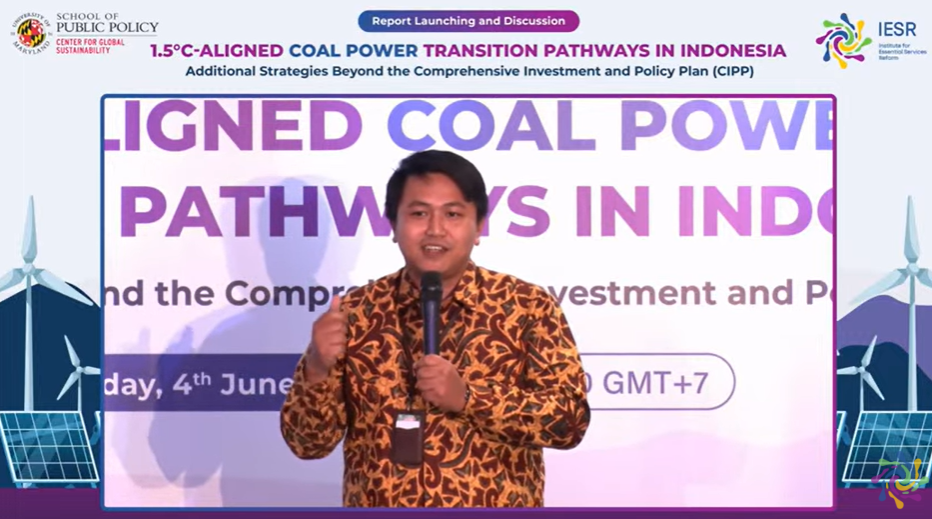
JAKARTA, INDONESIA | June 4, 2024 – The Institute for Essential Services Reform (IESR), Indonesia’s energy transition and environmental think tank, and the University of Maryland’s Center for Global Sustainability (CGS) launched two new studies focused on strategies for achieving a thriving clean energy transition in Indonesia. The first report assesses existing and proposed power plants to prioritize those that can be retired early in line with a pathway to limit global warming to 1.5°C. The study combined a global integrated assessment model (GCAM), a power system model (PLEXOS), and bottom-up analysis methods.
The second report contains a database of industrial estates in Indonesia so that it can expand the Just Energy Transition Partnership (JETP) Comprehensive Investment and Policy Plan (CIPP) initiative.
The Executive Director of the Institute for Essential Services Reform (IESR), Fabby Tumiwa, explained that electricity generation in Indonesia is still dominated by coal, around 60 to 70 per cent. The existence of the Domestic Market Obligation (DMO) policy to keep electricity costs affordable creates dependence and makes it difficult for the State Electricity Company (PLN) to switch from fossil energy to renewable energy. However, this policy change is needed to provide impetus for PLN to switch from coal to renewable energy. Government policy must bridge the short-term negative implications to stakeholders such as PLN and electricity consumers.
“This study analyzes PLN on-grid and off-grid power plants that use strategies to reduce coal-fired power plants (CFPP) capacity, flexible CFPP operations, early retirement, biomass burning, renewable energy substitution, construction cancellation, grid connection, and carbon storage. This study provides a bottom-up coal phase-down strategy that proposes a prioritized strategy for each PLTU unit based on CFPP characteristics and the suitability of CFPP’s role for electricity demand in their respective systems. This strategy recommendation can complement the existing JETP pathway,” Fabby said at the report launch (4/6/2024).
Director of CGS, Nate Hulman, said the launch event was a platform to discuss how Indonesia can implement a clean energy transition and contribute to the global 1.5 degrees Celsius target.
“Our new research offers an ambitious and transformative strategy critical to providing a new holistic framework for a transition strategy aligned with the 1.5°C target with national objectives in mind,” said Nate Hulman.
The 1.5°C-Aligned Coal Power Transition Pathways in Indonesia report found that between 2025 and 2050, biomass co-firing with sustainable sources at 80 off-grid coal-fired units (13 GW) could contribute to nearly half of the cumulative emissions reductions. Meanwhile, early operational retirement of coal-fired power plants could be implemented at 105 units (25 GW), contributing to nearly half of the cumulative emission reductions of on-grid power plants.
“Emission reductions in PLN’s electricity system need to be further boosted to offset the growth of off-grid/captive coal emissions shortly so that mitigation in PLN’s electricity system contributes to 68 per cent of cumulative emission reductions until 2050,” said Deon Arinaldo, Program Manager of Energy Transformation, IESR.
Achieving this accelerated coal energy transition will significantly transform Indonesia’s electricity system. Integrating increasing renewable energy sources will require new storage technologies, expansion of grid infrastructure, and stable and flexible operations. The analysis revealed that electricity generation costs (plant operating costs and fuel) could fall by 21 per cent by 2030 and 75 per cent by 2050 and reduce emissions from the power sector by 50 per cent by 2040. On the other hand, additional investment is needed to implement the transition strategy.
“Significant investments in new storage technologies, grid expansion, and stable and flexible operations are critical to building a resilient power system in Indonesia centred on renewable energy,” said Maria A. Borrero, CGS Research Associate and lead author of the report.
On the other hand, Jiehong Lou, Assistant Research Director at the Center for Global Sustainability, said the second report, titled Industrial Parks in Indonesia: Challenges and Opportunities for Sustainable Industrial Development, contains a database of 79 industrial parks with a total electricity capacity of 23.07 GW.
“This database addresses a critical knowledge gap regarding industrial parks, significantly increasing the availability of data critical to understanding demand and making informed decisions regarding captive coal development and other aspects related to industrial park research,” Jiehong Lou said.

